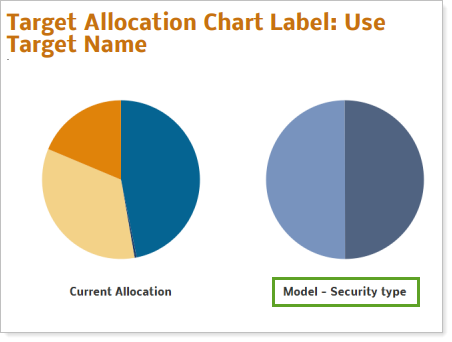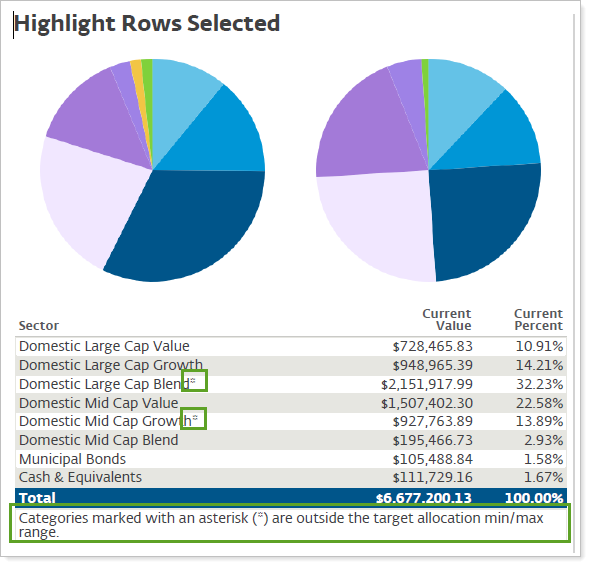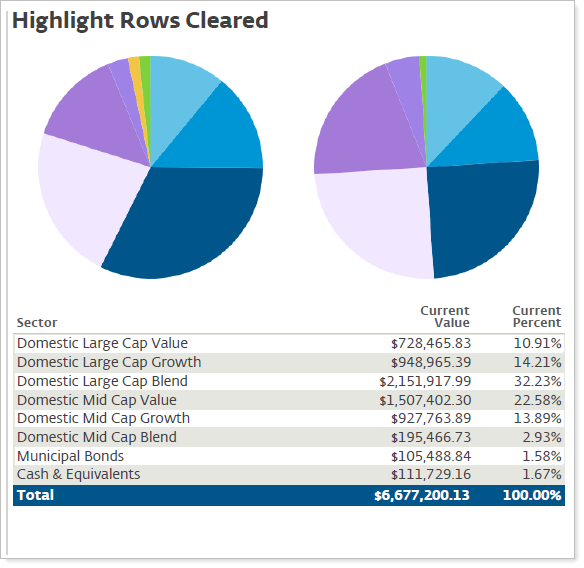Contents
|
|
How Include Current Allocation in Chart and Include Target Allocation in Chart Work
| Applies to: | ||
|---|---|---|
| Dynamic |
Client Portal |
|
The Asset Allocation section of the PDF Dashboard allows you to display pie charts of current allocation, target allocation, or both. When you choose to display target allocation, you can customize how it's labeled and mark securities that are out of tolerance, if desired.
Whether you choose to display the current allocation, the target allocation, or both together for comparison depends on the goals of your dashboard section. If you're focusing on reporting current holdings, current allocation may meet your needs. But if you want to focus on moving from an old allocation to a new target allocation, you might want to show target or target and current for comparison.
For more information about the Asset Allocation report and its settings, see Asset Allocation Report.
In Dynamic Reports
This setting is only available in the Asset Allocation section of the PDF Dashboard.
In PDF Reports

-
To include a pie chart showing the current allocation, select Include current allocation in chart. Clear the check box to omit the current allocation pie chart.
-
To include a pie chart showing the target allocation, select Include target allocation in chart. Clear the check box to omit the target allocation pie chart.
Note
If you clear both these check boxes, no pie chart will be displayed.
| Setting | More Information |
|---|---|
| Both Include current allocation in chart and Include target allocation in chart selected |
Notice that in this example, Show Pie Chart Titles is also selected. This makes it easy for clients to know which pie chart is which. |
| Only Include target allocation in chart selected |
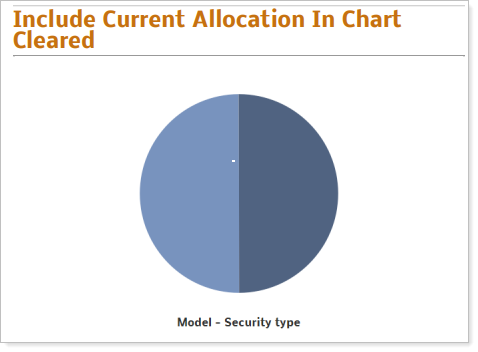
|
Target Allocation Chart Label

By default, if you include a target allocation pie chart and turn on chart titles, the target allocation title will be used. But if the name of the target allocation, while descriptive and appropriate for your firm, isn't useful for your clients, this setting allows you to customize the label shown beneath the target allocation pie chart.
-
To use the target allocation name as the pie chart label, select Use target name.
-
To use custom text as the pie chart label, select use text.
Note
To show chart labels, select Show Pie Chart Titles.
| Setting | More Information |
|---|---|
| Target allocation chart label is set to Use target name. |
Notice that the target allocation name doesn't necessarily tell clients much about that pie chart. The firm might choose to Use text to label the target allocation more meaningfully. |
| Target allocation chart label is set to Use text. |
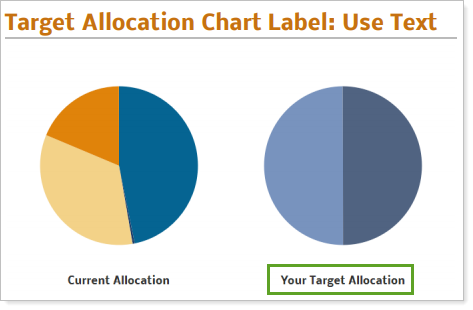
The firm has chosen to customize the name of the target allocation label to tell clients more about what that pie chart is, rather than using the potentially confusing target allocation name. |
Highlight rows outside target allocation min/max range

By default, when you show the target allocation pie chart and an accompanying chart legend, the legend table doesn't indicate which securities are out of range. This setting allows you to mark out-of-range securities on the chart legend with an asterisk.
-
To add an asterisk next to securities outside of the target allocation range, select Highlight rows outside target allocation min/max range.
-
To not mark out-of-range securities specifically, clear Highlight rows outside target allocation min/max range.
Note
This setting is only available if Show pie chart legend is selected.
| Highlight rows outside target allocation min/max range selected |
|---|
|
|
| Highlight rows outside target allocation min/max range cleared |
|
|
Reports With This Setting
PDF-Specific Reports
|
|
Holdings Reports
|
|
Related Settings
For more information on how to create or assign target allocations, see Target Allocations.
The following is related to this setting:




